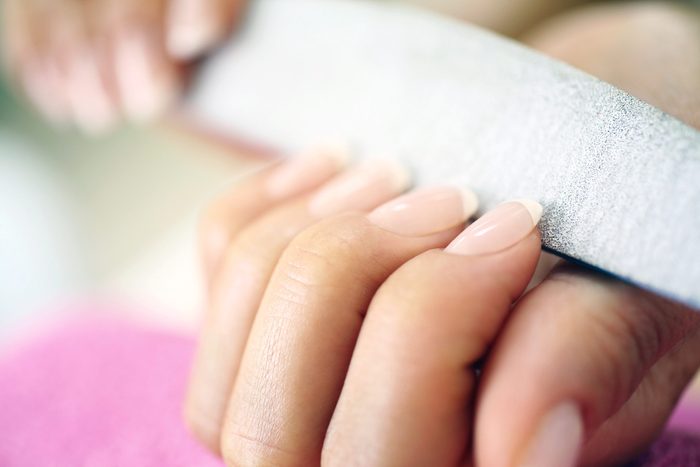
Your nails are brittle
When your body is running low on the mineral iron, parts of the body become weak and pale. This may express itself as brittle fingernails—or toenails—or pale inner eyelids. Women with heavy menstrual bleeding are at a greater risk for iron deficiency, as are vegetarian women—while men are more likely to have excess iron intake, according to a report by the Centers for Disease Control and Prevention (CDC). Be sure to watch out for these other signs of iron deficiency, too.
The fix: Premenopausal women need 18 milligrams (mg) a day, and men and postmenopausal women require 8 mg, according to the National Institutes of Health (NIH). Your body best absorbs animal-based iron, the type found in meat, poultry, and seafood. Pair vegetarian sources of iron, such as spinach or chickpeas, with citrus or other vitamin-C-containing foods to increase absorption.
Your blood pressure is too high
You may have a vitamin deficiency in vitamin D. Although only 3 percent of non-Hispanic whites are deficient, 31 percent of non-Hispanic blacks and 12 percent of Mexican-Americans don’t get enough vitamin D, according to the CDC report. Research has linked high blood pressure to a lack of vitamin D— although it’s not clear whether taking the supplement can help with hypertension once you have it.
The fix: Adults need 600 international units (IU) of vitamin D daily, according to the NIH. This is one nutrient that’s difficult to get from food, as few options contain significant amounts. But here are a few that do: swordfish, salmon, fortified milk and orange juice, and mushrooms grown in sunlight or UV light. And try these eight foods that may help reduce blood pressure for other reasons.

Your leg muscles are cramping
Your body needs the electrolyte potassium to help your muscles contract. A dip in levels of the mineral can cause muscle cramping, often appearing in the calf area. Potassium deficiency is rarely caused by low dietary intake—excessive sweating, diarrhea, vomiting, and loss of fluid are the more likely culprits. Here are the other signs you might have a potassium deficiency.
The fix: Women need 2,600 mg and men require 3,400 mg daily, and food sources include sweet potato, banana, avocado, and coconut water. Plus, try these other foods high in potassium.
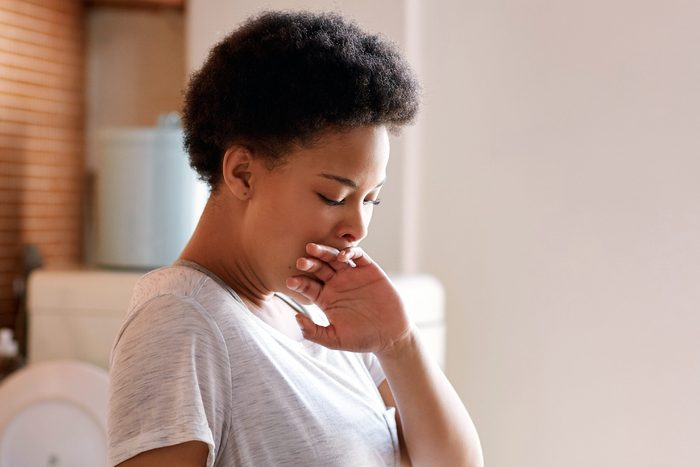
You’re feeling tired
While scurvy, or vitamin C deficiency, may make you think of pre-18th-century sailors, inadequate intake of the immunity-supporting nutrient is seen in specific groups, including smokers and people exposed to secondhand smoke. In fact, studies suggest that smokers have a more than a 30 percent greater risk of vitamin C deficiency. Feeling tired all the time and irritability are symptoms that you may have dipping C levels—don’t ignore these other signs you might have a deficiency, either.
The fix: Women need 75 mg daily, and men require 90 mg—while smokers need an extra 35 mg daily, according to the NIH. Citrus, cantaloupe, kiwi, pineapple, tomatoes, spinach, bell peppers, and broccoli are all excellent sources.
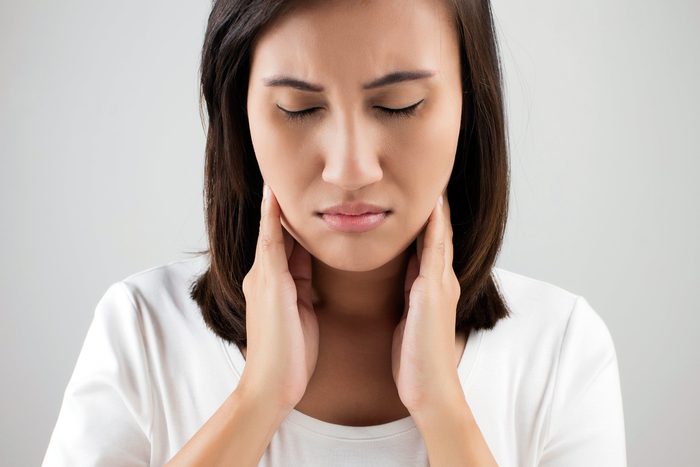
Your thyroid hormone production has dipped
You would only know this for sure via lab work, and low levels might be linked with decreased intake of the mineral iodine. Although rare in the United States, very low iodine levels may reduce production of the thyroid hormone, which could lead to hypothyroidism. Low iodine intake is especially worrisome for pregnant women—it can cause miscarriage and many other problems. Women of childbearing age had iodine levels just above iodine insufficiency, on average, in the CDC report. These subtle signs may indicate a thyroid problem.
The fix: Most adults need 150 mcg daily, while pregnant women need more (220 mcg), according to the NIH. If you cook with salt or add any to your food, opt for iodized salt over sea salt and other varieties. Seafood and dairy also contain iodine.
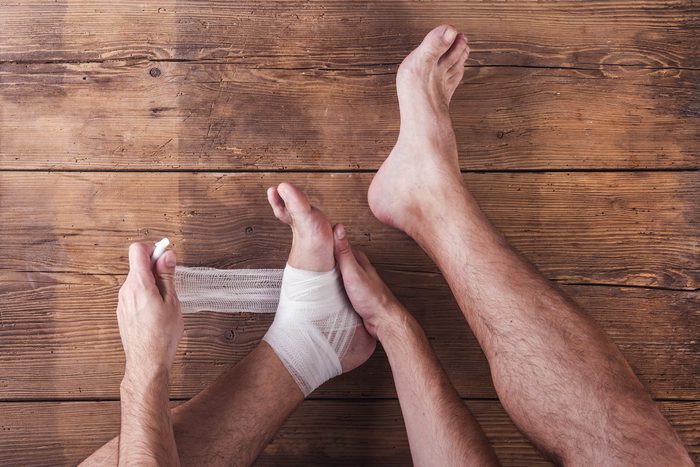
You’ve had several recent fractures
When you have a deficiency in the mineral calcium, you’re at risk for osteopenia, a condition that causes low bone mass and heightens risk of osteoporosis and bone breaks. Bones reach max strength at around age 30—at which point they start to slowly lose density. This is why it’s important to take in proper amounts of calcium, alongside weight-bearing activity such as walking and aerobics. Don’t miss these clear signs you’re not getting enough calcium.
The fix: Men and premenopausal women need 1,000 mg daily, and postmenopausal women require 1,200 mg, per the NIH. The best food sources of calcium include dairy (yogurt, milk, and cheese) and fortified foods (tofu and fortified juice). Some leafy greens (collard greens, turnip greens, and kale) deliver calcium, although it’s harder for your body to absorb. If you choose to take a supplement, divide into two doses and pair each with a meal.
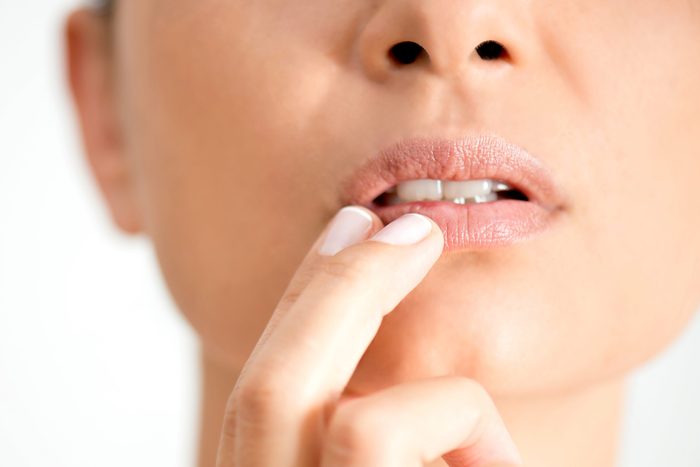
You have cracking at the corners of your mouth
Although not super common, a vitamin deficiency in vitamin B6 can reveal itself through skin conditions—including scaling on the lips or an inflamed tongue—as well as through depression or confusion. The body’s small supply of the water-soluble vitamin typically lasts several weeks, so deficiency appears once the body is fairly depleted. Some types of oral birth control may affect vitamin B6 status, as can certain corticosteroids and anticonvulsants.
The fix: People up to age 50 need 1.3 mg daily, while older women need 1.5 mg and older men require 1.7 mg, according to the NIH. Dietary sources include chickpeas, tuna, salmon, fortified cereal, bananas, and marinara sauce—although deficiencies are typically treated by a doctor with a daily supplement of 50 to 100 mg. Don’t ignore these other signs of a vitamin deficiency.
